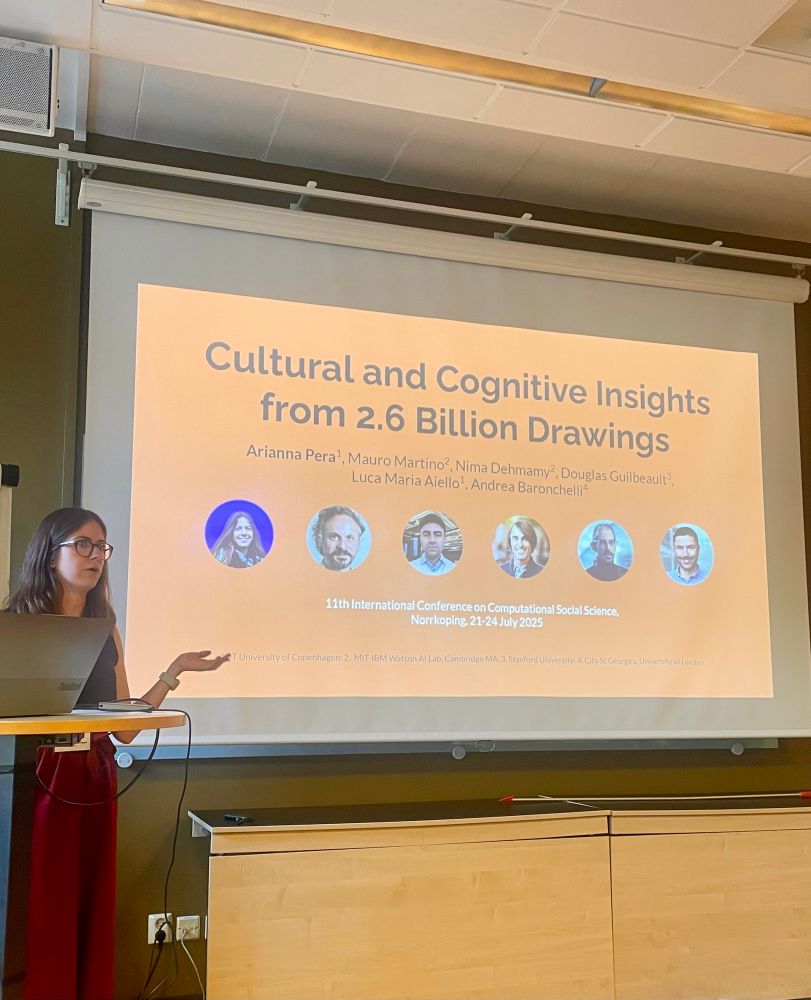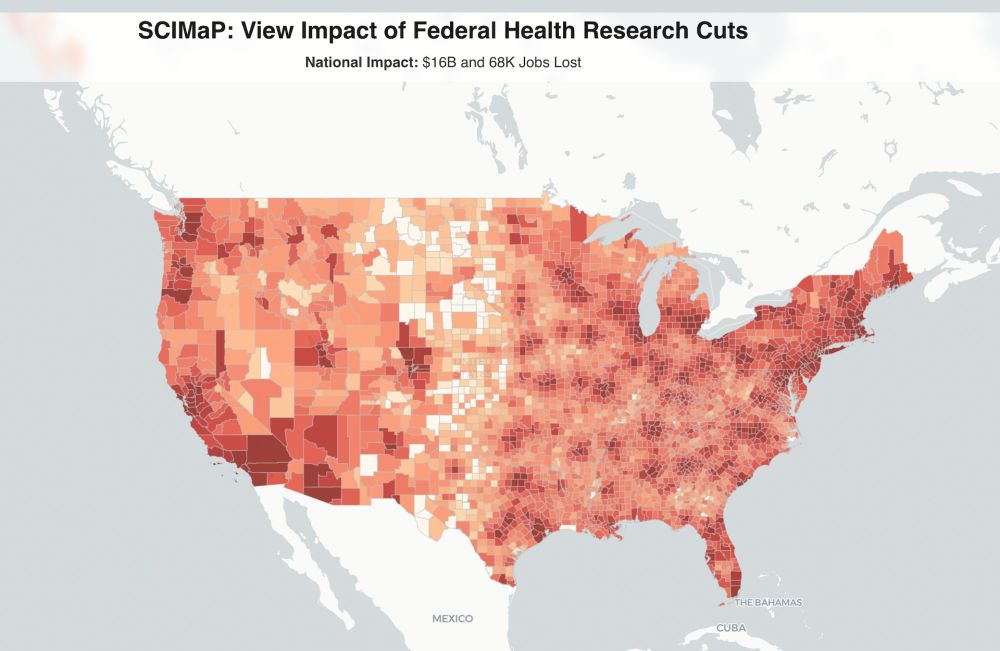We are honored to receive this recognition for our work and to see it spurring generative conversation 🙏 computational social science is increasingly poised to reveal and help us address pervasive social distortions in internet culture and AI. Thank you for your interest!
03.11.2025 19:35 — 👍 8 🔁 0 💬 0 📌 0
Very interesting! Thanks for sharing. I'd love to pick up on this thread when our paths cross (hopefully sooner than later!)
31.10.2025 21:39 — 👍 2 🔁 0 💬 1 📌 0
Thanks Laura! Very interesting comment. I agree that variance is an important and underrepresented angle in this discourse. What are some of the valuable questions and/or insights that you think can from shifting focus toward variance?
30.10.2025 23:00 — 👍 1 🔁 0 💬 1 📌 0

I am without the words to describe how thrilled our team is to see our paper selected for the cover of @Nature! As the tagline captures, we hope our study empowers others to see how tools in computational social science can provide critical "reality checks" for our social world! @nature.com
30.10.2025 00:09 — 👍 16 🔁 0 💬 0 📌 1
YouTube video by nature video
Would ChatGPT hire you? Your age and gender matter
I am incredibly honored to share that the Nature News team has released this fantastic video summarizing our paper and sharing my extended interview with Shamini Bundell. Shamini did a wonderful job!
www.youtube.com/watch?v=BGT7...
17.10.2025 15:19 — 👍 5 🔁 0 💬 0 📌 0

It's true: The internet skews the reality of women (and men) in the workforce
Age and gender biases are baked into what we see online, a large new study confirms.
Excellent coverage of our Nature paper (out today) by Mother Jones; their piece situates our findings in the broader context of evolving gender stereotypes over time and ongoing issues with biases in AI:
www.motherjones.com/media/2025/1...
08.10.2025 20:50 — 👍 4 🔁 0 💬 1 📌 0

How stereotypes shape AI – and what that means for the future of hiring
Hear the biggest stories from the world of science | 08 October 2025
I’m delighted to appear in this week’s episode of the @nature.com podcast, where we discuss our paper and its implications for the role AI is playing in reinforcing social biases on a large scale (e.g., via the biases ChatGPT introduces into hiring processes): www.nature.com/articles/d41...
08.10.2025 17:00 — 👍 1 🔁 0 💬 0 📌 0
YouTube video by Douglas Guilbeault
Age and Gender Distortion in Online Media and Large Language Models
The tldr of our study is captured in this short 3 minute video produced by Emma Richard:
www.youtube.com/watch?v=4Vdw...
08.10.2025 15:34 — 👍 1 🔁 0 💬 0 📌 0

Emergent Meaning: Networks, AI, and the Geometry of Our Collective Mind with Douglas Guilbeault
I had a great time speaking w @douglasguilbeault.bsky.social about his research on my podcast "Yes, this". We discussed AI, LLMs, AlphaGo, social contagions, categorization, mass influence, the new science of culture, and much more. Link here: open.spotify.com/episode/18R0...
27.08.2025 23:36 — 👍 3 🔁 1 💬 0 📌 0

Emergent Meaning: Networks, AI, and the Geometry of Our Collective Mind with Douglas Guilbeault
I had a great time speaking w Julia Bunte-Mein
about my research on her podcast "Yes, this". We discussed AI, LLMs, AlphaGo, social contagions, categorization, mass influence, the new science of culture, and much more. Link here: open.spotify.com/episode/18R0...
26.08.2025 20:45 — 👍 2 🔁 0 💬 0 📌 0

Presented our work, “Cultural and Cognitive Insights from 2.6 Billion Drawings,” at @ic2s2.bsky.social this morning. Big thanks to Mauro Martino, Nima Dehmamy, @douglasguilbeault.bsky.social, @lajello.bsky.social, and @baronca.bsky.social for the collaboration ✨
Stay tuned for more results!
23.07.2025 15:20 — 👍 41 🔁 7 💬 0 📌 0
An interesting direction for future research will be to explore whether (and ideally how) incorporating multimodal representations into LLMs shapes their capacity to emulate human embodied metaphorical reasoning, especially about metaphors relating to vision.
12.06.2025 03:10 — 👍 0 🔁 0 💬 0 📌 0
Huge kudos to Ethan Nadler for leading this effort, and for our fantastic global team of collaborators: Sofronia Ringold, Tom Williamson, Antoine Pepin, Iulia-Maria Comşa, Karim Jerbi, Srini Narayanan, and Lisa Aziz-Zadeh.
12.06.2025 03:10 — 👍 0 🔁 0 💬 1 📌 0
This was a massive interdisciplinary effort – including physicists, neuroscientists, social scientists, and AI researchers from @Google DeepMind.
12.06.2025 03:10 — 👍 0 🔁 0 💬 1 📌 0
This has implications for the ongoing conversation around whether and to what extent LLMs can be treated as meaningful emulators of human cognition for psychological and/or sociological studies.
12.06.2025 03:10 — 👍 0 🔁 0 💬 1 📌 0
This suggests perceptual experience plays a role in metaphorical reasoning. It further suggests that LLMs are limited in their ability to recover the embodied aspects of metaphorical reasoning from statistical correlations among words alone.
12.06.2025 03:10 — 👍 0 🔁 0 💬 1 📌 0
We show that LLMs’ struggle to reason coherently about novel color metaphors and are less likely to reference embodied experience in their interpretations. By contrast, painters exhibit the highest rate of embodied reasoning when interpreting novel color metaphors.
12.06.2025 03:10 — 👍 0 🔁 0 💬 1 📌 0
OSF
𝐃𝐨 𝐋𝐋𝐌𝐬 𝐡𝐚𝐯𝐞 𝐬𝐲𝐧𝐞𝐬𝐭𝐡𝐞𝐬𝐢𝐚? In a forthcoming paper in 𝐶𝑜𝑔𝑛𝑖𝑡𝑖𝑣𝑒 𝑆𝑐𝑖𝑒𝑛𝑐𝑒, we show yes! But this synesthesia deviates significantly from the color associations of ppl, incl. colorseeing, colorblind, and painters.
osf.io/preprints/ps...
12.06.2025 03:10 — 👍 3 🔁 0 💬 1 📌 0

Hyacinth's Fall
Like the flower blooming from Hyacinthus's blood, something new emerges from grief.
(Guitar samples by metachemist)
One of my latest choons already has 1K streams. Nice little surprise. A mournful drum and bass track in collaboration with @douglasguilbeault.bsky.social (aka metachemist). Nothing's better than getting a like or comment on SoundCloud!
11.04.2025 23:35 — 👍 3 🔁 1 💬 0 📌 0

Title page of paper:
To Improve Literacy, Improve Equality in Education, not Large Language Models
New 💫
Letter to the Editor in Cognitive Science, by @samhforbes.bsky.social & @olivia.science
lnkd.in/eea8Cwmd
04.04.2025 21:00 — 👍 106 🔁 28 💬 2 📌 0

Data-Driven, Interactive Map Shows Local Economic Impact of Cuts to Federal Funding for Health Research
Researchers at Annenberg and @umdscience.bsky.social show that proposed NIH funding cuts lead to an estimated $16 billion in economic loss and 68,000 jobs lost nationwide. Learn about their project and view the interactive map here:
03.04.2025 18:57 — 👍 114 🔁 86 💬 1 📌 5
Thank you for your interest! We welcome any and all feedback.
03.04.2025 23:38 — 👍 0 🔁 0 💬 0 📌 0
We are deeply grateful to the authors of Centola & Baronchelli (2015) and Centola et al. (2018) for sharing their experimental data and for enriching discussion. We are also grateful to colleagues in the broader community who have given us helpful feedback, as highlighted in our acknowledgements.
03.04.2025 23:38 — 👍 0 🔁 0 💬 1 📌 0
Our framework not only provides more accurate predictions of behavioral data, but it also does so with a simple, highly interpretable mathematical model that synthesizes findings across the social sciences (from linguistics, psychology, economics, and sociology).
03.04.2025 23:38 — 👍 0 🔁 0 💬 1 📌 0
Our findings highlight the benefit of adopting a theoretically-driven, psychologically-grounded angle toward modeling human social learning.
03.04.2025 23:38 — 👍 0 🔁 0 💬 1 📌 0
Despite their many achievements, the accelerating embrace of machine learning (and LLMs specifically) as a framework for simulating human learning is likely to maintain this blind spot, since such models are designed to emulate human behavior through a brute force, statistically optimized approach.
03.04.2025 23:38 — 👍 1 🔁 0 💬 1 📌 0
One key takeaway in our view is that the currently in vogue optimization-based models of human cognition and behavior may systematically overlook some of the fundamentally simple and categorical processes that characterize human social learning as satisficing.
03.04.2025 23:38 — 👍 1 🔁 0 💬 1 📌 0
Assistant Professor of Innovation Studies & Economic Geography @ The University of Hong Kong.
I study innovation, collaboration, tech & geography
Previously at UCLA & Kellogg School of Management
sociology phd candidate @duke | https://tkeskinturk.github.io/
- Alum: University of Oxford, Blavatnik School of Government
- University of Syracuse, Maxwell School of Citizenship
- Chevening Fellow, Fulbright Hubert H. Humphrey Fellow, Police Officer.
Justice not enforcement
Sociological Science is a general interest, open access sociology journal committed to the highest standards of rigor and relevance. We aim to be the flagship journal for social scientists committed to advancing a general understanding of social processes.
Business/tech trends, AI, economics/public policy, mild sarcasm.
Tech and Geopolitics Fellow, @belfercenter.bsky.social / @harvardkennedy.bsky.social
Founder, Tenon Research
Posing/answering key questions about AI: https://unfoldingai.substack.com/
Professor of Computer Science at Fudan University, former postdoc at Duke University, Senior Associate Editor of the ACM Transactions on Social Computing, fan of Hannover 96, Senior Member of ACM/IEEE || https://chenyang03.wordpress.com/
Uses machine learning to study literary imagination, and vice-versa. Likely to share news about AI & computational social science / Sozialwissenschaft / 社会科学
Information Sciences and English, UIUC. Distant Horizons (Chicago, 2019). tedunderwood.com
Assistant Professor of Sociology at Northwestern
Culture, political sociology, NLP, social networks, computational social science
oscarstuhler.org
Assistant Professor of Strategy | U van Amsterdam | él/him
#Curious = #Physicist + #Engineer + #SocialScientist
Blog: arrieta.science/not-normal
Amsterdam / Düsseldorf
i build esoteric tools to help find patterns in epistemic data.
Sociologist at Colorado State University | Parenting, Inequality, Stratification, Econ Soc, Family Demography, Quantitative Methods, Computational Social Science, whatever seems interesting right now…
https://ophastings.com
PhD student in Computational Social Science at @itu.dk @nerdsitu.bsky.social | Visiting Scholar at @umich.edu and @ceu-dnds.bsky.social
Postdoc in Analytical Sociology @Linköping University, reality TV enthusiast & ganska ”skoj”. https://mhbodell.github.io
Prof of Cognitive Neuroscience & Vice Dean at UCL, Fellow of the Royal Inst. of Navigation. I study how we remember, navigate & imagine space
Photo: Our upcoming field research in the Marshall Islands
https://spierslab.wixsite.com/wavesandwayfinding
Lecturer in Social Statistics & Demography, University of Manchester. Also affiliated with Oxford (Sociology & Nuffield), the Max Planck Institute for Demographic Research, and the Centre for Population Change.
The Oxford Internet Institute (OII) is a multidisciplinary research and teaching department at the University of Oxford, that collectively helps shape the development of our digital world for the public good.
Sociology postdoctoral student at @iasliu, Linköping University, Sweden. I study neighborhood effects and spatial inequalities using register data.
Cultural evolution - Cognitive Science - Cognitive Anthropology. Assistant Professor of Organizational Behavior at Stanford GSB. Formerly postdoc fellow at the Santa Fe Institute.













